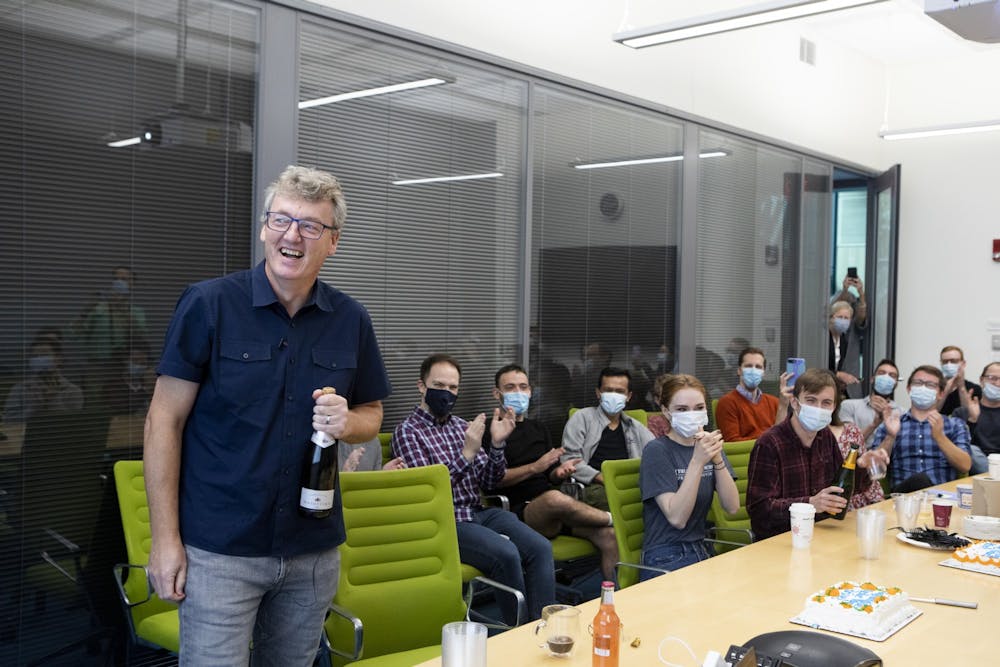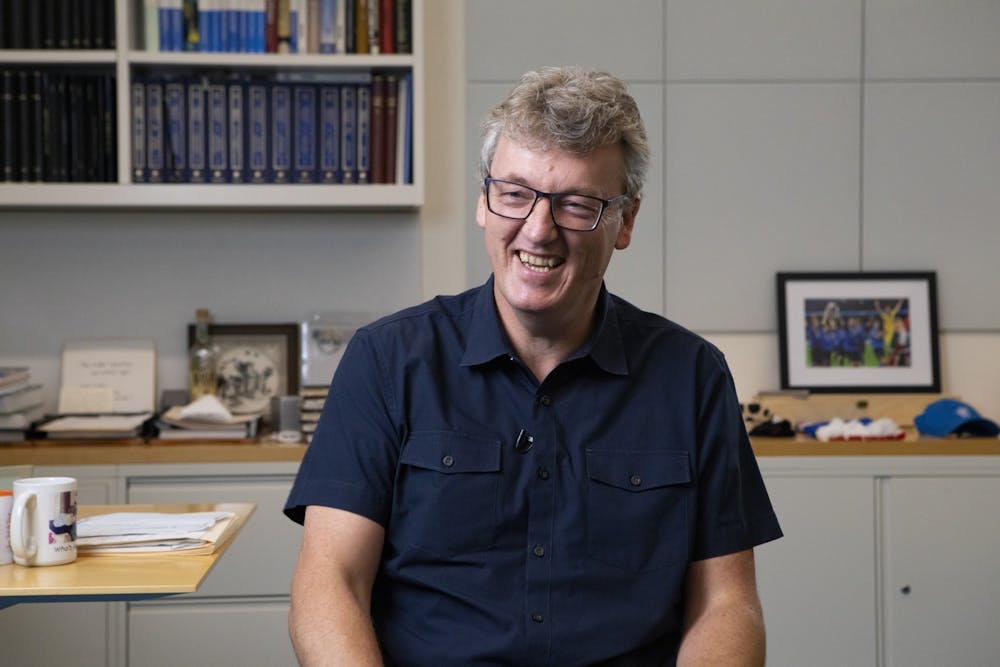For the second consecutive day, a Princeton University scientist was honored with the world’s highest distinction in their field of research, as David W. C. MacMillan, the James S. McDonnell Distinguished University Professor of Chemistry, was awarded the 2021 Nobel Prize in Chemistry.
MacMillan shares the prize with German chemist Benjamin List, a director at the Max Planck Institute for Coal Research in Mülheim an der Ruhr, Germany, "for the development of asymmetric organocatalysis."
The prize money of 10 million Swedish kroner, or approximately $1.14 million, will be shared equally between MacMillan and List.
In a message shared over Facebook Wednesday evening, President Christopher L. Eisgruber ’83 congratulated both University recipients of the Nobel Prize.
“These two brilliant scientists have both advanced our understanding of the world and also helped to build centers of excellence in environmental science and chemistry at our University,” Eisgruber said. “Their lives and work embody Princeton’s academic mission and speak to our informal motto, ‘in the nation’s service and the service of humanity.’”
The prize was announced by Secretary General of the Royal Swedish Academy of Sciences Göran K. Hansson, in Stockholm, Sweden, at 5:45 a.m. ET on Wednesday.
The University held a press conference in Richardson Auditorium on Wednesday afternoon to celebrate MacMillan and his achievement. MacMillan was joined on stage by University Provost Deborah Prentice, University Spokesperson Ben Chang, and Chair of the Department of Chemistry Gregory Scholes.

“Without science, we wouldn’t have anything. Society, ways of being, interacting — we’d have nothing. So, we need science,” said MacMillan, when asked about the importance of science. “Once you get to that basic level of understanding, you have to get back to trusting the facts, trusting the truth.”
Those in attendance praised MacMillan’s contributions to science and the University.
“Ever since David arrived to Princeton in 2006, it’s been his mission to make Princeton’s chemistry department one of the best in the world,” Gregory Scholes said. “And clearly, he’s leading by example.”
MacMillan’s research is primarily focused on understanding new concepts in catalysis: the process through which substances called catalysts control and accelerate chemical reactions without becoming part of the reactions’ end products. Catalysis makes up a key step in the molecular construction of substances like plastic, perfumes, and medical drugs.

Chemists had long believed that the only two types of catalysts available are metals and enzymes, both of which have substantial drawbacks.
Metal catalysts, such as iron or platinum, are often toxic and harmful to the environment. They are also very sensitive and must be protected from oxygen and moisture, making them difficult to use in labs.
Enzymes, which are a group of large proteins found in nature, are efficient when catalyzing chemical reactions in nature, but their large size makes them very challenging to design in a laboratory setting.
Organocatalysis — a name coined by MacMillan early in his career at the University of California, Berkeley — takes advantage of small organic molecules called organocatalysts. Organocatalysts are made up of small elements easily found in nature, making them much safer, easier, and cheaper to use and produce than metals.
Another key advantage of the organocatalysts highlighted by the Nobel Committee is their ability to drive asymmetric catalysis.
Using enzymes or metals as catalysts often produces large quantities of mirror-image molecules, resulting in great waste. The organic catalysts independently pioneered by List and MacMillan are excellent at driving asymmetric catalysis, producing only one of the two mirror-images.
In an interview conducted after the prize announcement in Stockholm, Peter Somfai, a member of the Nobel Committee for Chemistry and an organic chemist at Lund University, explained the significance of the laureates’ work with an analogy to the game of chess.
“Think about playing chess, then introduce a new player on the chessboard that has new rules,” Somfai explained. “That means you can think about the game in a different way and you can execute the game in a different way, and that is the power of new methodology when it comes to organic chemistry.”
MacMillan is the sixth individual affiliated with the University and the first faculty member at the University to be awarded the Nobel Prize in Chemistry. Frances Arnold ’79, who shared the 2018 prize “for the directed evolution of enzymes,” is the most recent recipient.
A dual citizen of the United States and the United Kingdom, MacMillan was born in 1968 in Bellshill, Scotland. He received his undergraduate degree in chemistry from the University of Glasgow in 1991 and then moved to the United States for graduate studies at the University of California, Irvine, where he completed his Ph.D. in organic chemistry in 1996.
After receiving his Ph.D., MacMillan worked as postdoctoral researcher at Harvard University for 2 years before becoming a faculty member at the University of California, Berkeley. He moved to the California Institute of Technology in 2000, where he remained until he joined Princeton’s faculty as the A. Barton Hepburn Professor of Chemistry in 2006.
MacMillan was named the James S. McDonnell Distinguished University Professor of Chemistry in 2011 and served as Chair of the Department of Chemistry from 2010 to 2015, beginning his tenure during the same year in which the state-of-the-art Frick Chemistry Laboratory opened.
MacMillan is a member of the U.S. National Academy of Sciences, a member of the American Academy of Arts and Sciences, and a fellow of the Royal Society. His numerous other honors include the Corday-Morgan Medal of the Royal Chemical Society (RCS) in 2004 and the Centenary Prize of the RCS in 2019.
MacMillan was not available for comment by the time of publication.

David MacMillan celebrates with his lab group and graduate students.
Courtesy of Princeton University, Office of Communications, Denise Applewhite (2021)
Allan Shen is a senior writer who often covers research and obituaries. He can be reached at fuluns@princeton.edu, or on Twitter at @fulunallanshen. He previously served as an Associate News Editor.
Mahya Fazel-Zarandi is a news contributor for the 'Prince'. She can be reached through email at mahyaf@princeton.edu.








